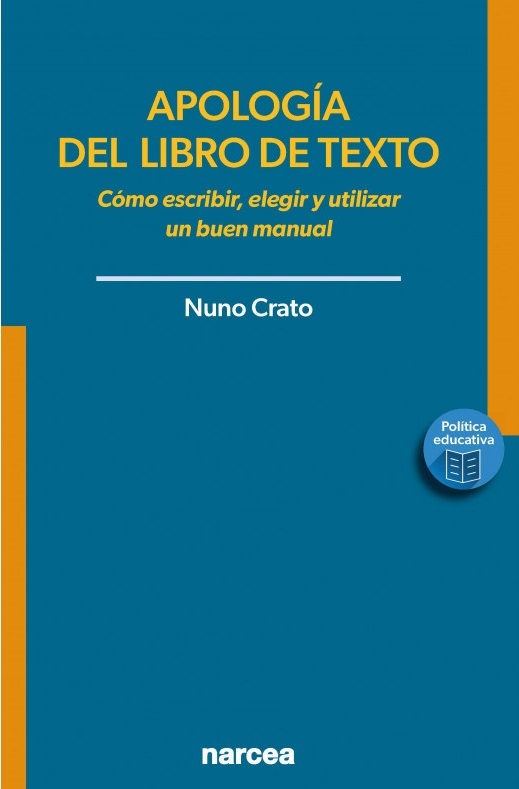- Books
- 16 de October de 2024
- No Comment
- 6 minutes read
Apología del libro de texto

Apología del libro de texto
How to write, choose and use a good manual


Eva Serra
In the face of so many postmodern attempts to circumvent the transmission of structured knowledge in educational centres, Nuno Crato’s book Apologia del libro de texto (Narcea, 2024), emerges as a breath of fresh air. It dismantles fallacies, clarifies doubts and presents evidence, through cognitive psychology studies, quotations, references, analysis and data, that the best learning process continues to be a demanding curriculum accompanied by exams and a good textbook.
The textbook has always been the elementary and necessary tool of any curriculum. “It is the embodiment of a study plan, articulated in an organized and sequential exposition of topics,” says Crato, while explaining that a textbook must be simple in its writing, precise in its description and rich in its pedagogical ambitions. The manual should avoid confusing or convoluted linguistic pretensions when the aim is to transmit knowledge. For instance, if it is necessary to repeat “apples” four times to make a statement clear, this will be better than replacing it with “fruit”; reiteration when transferring clear concepts is welcome in a textbook. Likewise, it must be progressive, block upon block, knowledge upon knowledge, based on the fact that prior learning is what leads us to understand and assimilate new concepts.
Crato’s ‘apology’ also points to many other issues of extreme educational confusion. For example, he addresses the biased and so frequently distorted interpretation of the concept of “meaningful learning”, coined by the American psychologist David P. Ausubel which has been overly praised by competency-based pedagogy within the constructivist framework as ‘the latest innovation’. Crato explains that Ausubel, in describing the pedagogical controversies of his time, already stated in his 1963 book The Psychology of Meaningful Verbal Learning, that “for the past three decades, there has been an emphasis on project-based teaching, manipulative experiences, discovery and problem-solving.” That is to say, this all dates back to the 1930s, according to Ausubel himself, who maintained that learning occurs by assimilating thought structures and concepts that have previously been transmitted to us. It is obvious that we cannot, no matter how much effort we put in, independently discover the law of gravity, nor can we easily achieve combustion by rubbing a couple of stones together– try it, if you must.
The book also sets out some very useful cognitive principles for outlining the suitability of a good textbook – its writing, use and selection – and dismantles erroneous concepts such as active learning, which in its constructivist version conveys the idea that listening to a teacher is a passive experience for students. Nothing could be further from Crato’s intention. He states: “When students really learn, even when merely listening to a teacher’s presentation, they are active processors, not passive archivists, of the information being stored in their memory.”
With a magnificent preface by Francisco López Rupérez and two splendid “intermezzos“, Nuno Crato’s work draws us back to the need for structured, systematic knowledge in our schools. The author was not the architect of the best academic results of Portuguese students in vain, while he held the Ministry of Education and Science of his country, Portugal, from 2011 to 2015. He is a renowned international reference on education, and was recently appointed as a member of the French State’s for National Education Scientific Council (CSEN).
___
→ Interview with the author: Nuno Crato: “Textbooks are essential for good training”
Title: Apología del libro de texto. Cómo escribir, elegir y utilizar un buen manual.
Author: Nuno Crato
ISBN: 9788427731967
Publisher: Narcea
Language: Spanish
Number of pages: 143
Publication date: 2024
Source: educational EVIDENCE
Rights: Creative Commons

